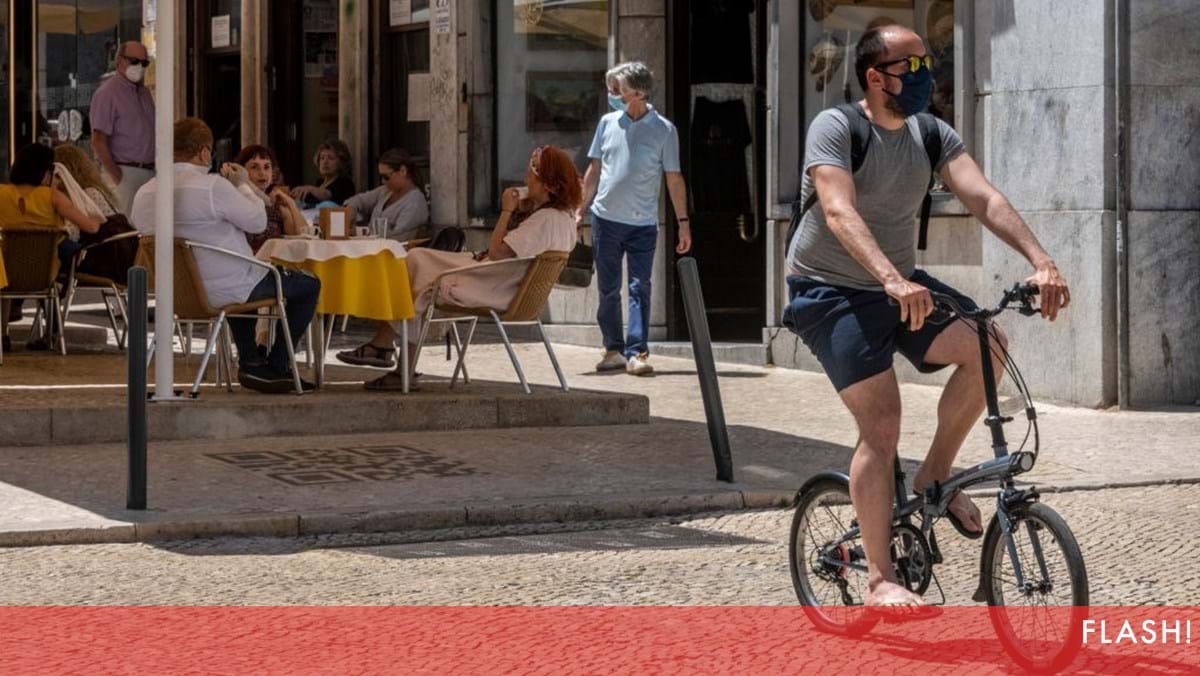
[ad_1]
The Government approved this Saturday the measures of the state of emergency that will come into force between Monday and November 23, providing for a night curfew during the week in 121 municipalities with the highest risk of contagion, among other measures.
In these 121 municipalities, where there is a “high risk of transmission of covid-19”, which cover 70% of the resident population, that is, 7.1 million inhabitants in Portugal, including all the municipalities of the Metropolitan Areas of Lisbon and Porto, The circulation will also be limited for the next two weekends between 1:00 p.m. on Saturday and 5:00 a.m. on Sunday and 1:00 p.m. on Sunday and 5:00 a.m. on Monday.
The executive also approved other measures that will be applied to mainland Portugal, such as the possibility of measuring body temperature by non-invasive means and the possibility of requiring diagnostic tests for covid-19.
Last week, the Government had already approved other measures to contain the covid-19 pandemic.
Continental Portugal
– Groups in restaurants limited to six people, unless they belong to the same household.
– Possibility of taking body temperature measurements by non-invasive means, in access to workplaces, educational establishments, means of transport, commercial, cultural and sports spaces.
In the event of refusal to measure body temperature or in cases where the body temperature is equal to or greater than 38º C, the impediment to access the mentioned places may be determined.
The measurement of body temperature does not affect the right to the protection of individual data.
– Possibility of requiring diagnostic tests for covid-19 in health establishments, residential structures, educational establishments, at the entrance and exit of the national territory, by air or sea, in Penitentiary establishments and other places, when determined by the General Directorate of Health .
– Possibility of requesting resources, means and health establishments from the private and social sector, prior to an agreement and with fair compensation.
– Mobilization of human resources to reinforce the tracking capacity, such as conducting epidemiological inquiries, contact tracing, tracking people under active surveillance, workers in prophylactic isolation, workers in risk groups, teachers without a teaching component, Armed military personnel .
High risk counties
There are 121 municipalities in mainland Portugal that have been in partial confinement since last week, following the criterion of having “more than 240 cases per 100,000 inhabitants in the last 14 days” or due to the proximity to another municipality in this situation.
The list of municipalities will be updated every 15 days. The next review will take place on Thursday.
Measures for the 121 counties:
– Duty to stay at home, except for the group of previously authorized trips.
– Commercial establishments close until 10:00 p.m.
– Restaurants must close at 10:30 pm.
– The mayors of the town councils may set a closing time below the established maximum limit, with the prior favorable opinion of the local health authority and the security forces.
– Events and celebrations with more than five people are prohibited, unless they belong to the same household.
– The councilors decide to hold uprising fairs and markets.
– Religious ceremonies and shows are allowed in accordance with the regulations of the General Directorate of Health.
– Mandatory teleworking whenever the functions in question allow it, unless the employee is disabled.
– Exceptional and temporary labor reorganization regime applicable to companies with jobs of 50 or more workers.
– Prohibition of circulation on public roads between 11:00 p.m. and 5:00 a.m. from Monday to Friday and the weekends of November 14 and 15 and November 21 and 22 from 1:00 p.m. (exceptions are foreseen such as trips to work, return home, emergency situations or pets walking, among others).
These measures cover the municipalities of Alcácer do Sal, Alcochete, Alenquer, Alfândega da Fé, Alijó, Almada, Amadora, Amarante, Amares, Arouca, Arruda dos Vinhos, Aveiro, Azambuja, Baião, Barcelos, Barreiro, Batalha, Beja, Belmonte, Benavente, Borba, Braga, Bragança, Cabeceiras de Basto, Cadaval, Caminha, Cartaxo, Cascais, Castelo Branco, Castelo de Paiva, Celorico de Basto, Chamusca, Chaves, Cinfães, Constância, Covilhã, Espinho, Esposende, Estremoz, Fafe, Felgueiras , Figueira da Foz, Fornos de Algodres, Fundão, Gondomar, Guarda, Guimarães, Idanha-a-Nova, Lisbon, Loures, Lousada, Macedo de Cavaleiros, Mafra, Maia, Marco de Canaveses, Matosinhos, Mesão Frio, Mogadouro, Moimenta da Beira, Moita, Mondim de Basto, Montijo, Murça, Odivelas, Oeiras, Oliveira de Azeméis, Oliveira de Frades, Ovar, Paços de Ferreira, Palmela, Paredes de Coura, Walls, Penacova, Penafiel, Peso da Régua, Pinhel, Ponte de Lima, Porto, Póvoa de Varzim, Póvoa do Lanhoso, Redondo, Ribeira da Pena, Rio Maior, Sabrosa , Santa Comba Dão, Santa Maria da Feira, Santa Marta de Penaguião, Santarém, Santo Tirso, São Brás de Alportel, São João da Madeira, São João da Pesqueira, Sardoal, Seixal, Sesimbra, Setúbal, Sever do Vouga, Sines, Sintra , Sobral de Monte Agraço, Tabuaço, Tondela, Trancoso, Trofa, Vale da Cambra, Valença, Valongo, Viana do Alentejo, Viana do Castelo, Vila do Conde, Vila Flor, Vila Franca de Xira, Vila Nova de Cerveira, Vila Nova de Cerveira Famalicão, Vila Nova de Gaia, Vila Pouca de Aguiar, Vila Real, Vila Velha de Ródão, Vila Verde, Vila Viçosa and Vizela.
[ad_2]